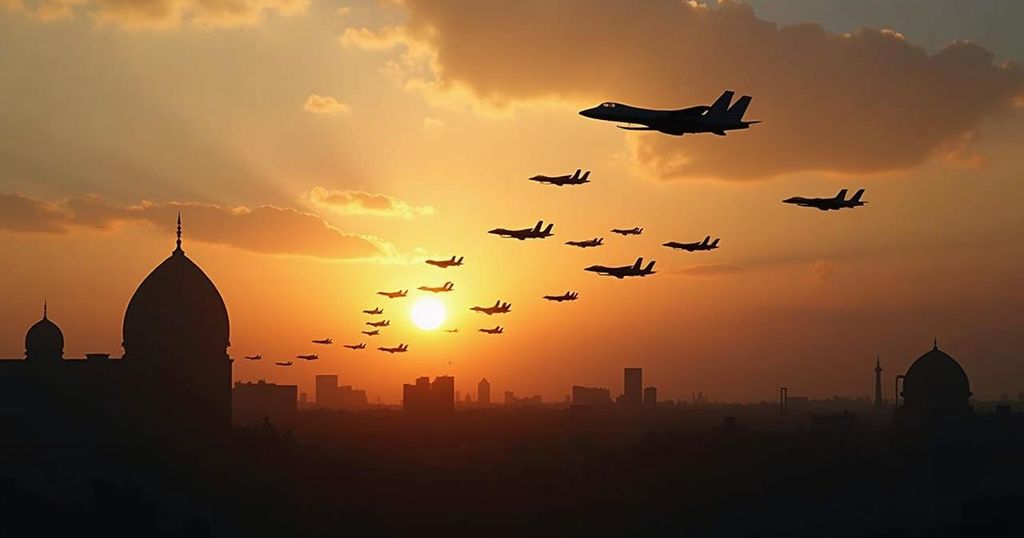Egyptian Airspace Operating Normally Amid Iran-Israel Conflict

The Egyptian Ministry of Civil Aviation has confirmed the normal operation of air traffic despite Iran’s missile attacks on Israel. Following the closure of airspace in Jordan and Iran, flight operations remain safe within Egypt. The Iranian strike is noted as a significant retaliation prompted by recent Israeli actions, raising concerns about the potential for broader conflict in the region.
CAIRO – As of October 2, 2024, the Ministry of Civil Aviation in Egypt has confirmed that air traffic operations within Egyptian airspace remain steady and secure despite the recent missile assault by Iran on Israel. The Ministry reassured travelers that their operations are continuing under stringent safety protocols. The situation arose following Iran’s launch of nearly 200 missiles targeting Israeli military sites, marking a significant escalation in military engagement. This assault was characterized as a substantial retaliation related to recent Israeli actions, including the assassinations of key figures from the Hezbollah and Hamas organizations. The Iranian missile strike doubles the scale of previous attacks made by Iran. Egypt’s Minister of Civil Aviation has noted that there has been ongoing collaboration with regional partners due to the closure of airspace in both Jordan and Iran. Egyptian airlines, such as EgyptAir, have implemented necessary adjustments to their flight schedules due to these developments. Specifically, flight MS 701, which was en route from Cairo to Amman, was redirected back to Cairo as a consequence of Jordan’s airspace closure. Cairo International Airport has heightened its alert status in anticipation of potential rerouted flights from the affected regions. Travelers intending to fly to Baghdad, Erbil, or Jordan have been advised to consult their flight arrangements as the situation unfolds. Compounding the tension, Israeli Prime Minister Benjamin Netanyahu assured a forceful retaliation against Iran’s recent actions, citing an emergency security meeting held shortly after the missile attacks. The Israeli military reported successes in intercepting many of the incoming missiles, attributing the defensive measures to a coalition effort led by the United States. Iran’s Islamic Revolutionary Guards Corps also claimed that their newly deployed hypersonic Fattah missiles achieved a notable success rate in this strike. Amidst these developments, calls for de-escalation have surfaced from numerous international entities, including the European Union and the United Nations, urging for a ceasefire to halt the further escalation of violence in the region. Nevertheless, as hostilities progress, the potential for a wider conflict looms over the region.
The global landscape surrounding the recent missile attack from Iran onto Israel has become increasingly volatile, particularly following a history of tension in the region due to various military engagements. Iran initiated this attack in response to the perceived aggressions from Israel, notably the targeted killings of prominent leaders within militant groups associated with Hezbollah and Hamas. Amid tighter regional security, responses from other nations, including the shutting down of airspace in neighboring countries like Jordan, underscore the escalating security concerns that surround these military actions. Egypt, being strategically located and involved in dialogue regarding peace in the region, plays a crucial role in maintaining flight operations and regional security efforts amidst this turmoil.
In summary, the recent missile strikes by Iran against Israel have significantly heightened tensions in the region. While Egypt maintains secure air operations, neighboring countries have taken precautionary measures affecting air travel. The international community continues to advocate for peace and stability as both Iran and Israel prepare for potential further escalations. The evolving situation requires close monitoring as it influences air traffic, regional security, and international diplomatic efforts.
Original Source: www.egypttoday.com





